Rx Park
Air Date: Week of December 15, 2017
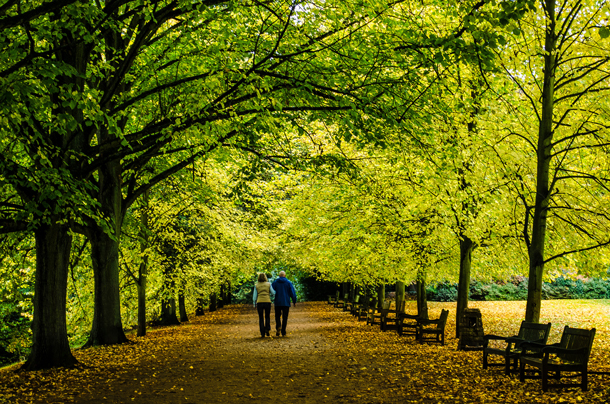
Getting out in nature – whether that’s the wilderness, or our local park – can have big benefits for human health on many levels, says Dr. Robert Zarr. (Photo: Garry Knight, Flickr CC BY 2.0)
Getting outside is a prescription for better health, says pediatrician Robert Zarr. Dr. Zarr, who founded and directs the nonprofit Park Rx America, prescribes going outdoors, because, he says, seeing trees and hearing birds can help treat childhood maladies such as obesity, depression and disruptive behavior. Dr. Zarr joins host Steve Curwood to examine just why a breath of fresh air is so healing.
Transcript
CURWOOD: Going for a jog, or even a long walk outdoors has well-known benefits to our health. But research suggests that even without much physical activity, just stepping into the natural world can enhance well-being. Pediatrician Robert Zarr is putting it to the test. He is founder and medical director of Park Rx America, and he not only encourages patients to spend time in nature, he actually prescribes it. Dr. Zarr, welcome to Living on Earth.
ZARR: Thanks for having me, it's a delight to be here.
CURWOOD: So, what gave you the idea to start prescribing time in nature for your patients?
ZARR: Well, I wish I could claim to be the inventor of this idea. Clearly this is an idea has been around for a while now and, frankly, you know, I was lucky that the Australian Healthy Parks Healthy People initiative was adopted by the National Park Service of the US. And so that's really how I kind of started to hear about this, and I was also inspired by one of the books has changed my life, "Last Child in the Woods." I've gotten to know Rich Louv over the last few years now and am very grateful for the ideas that he outlined in his book about why it actually has some substantial therapeutic effects to be in nature.

The National Arboretum in Washington DC is a public park that Dr. Zarr frequents. His organization, Park Rx America, works to link patients with local urban green space. (Photo: Nicolas Raymond, Flickr CC BY 2.0)
CURWOOD: So, what prompts you to make these prescriptions? What sort of maladies can this treat?
ZARR: Well, I mean the science tells us that being in a natural setting and being mindful in particular in a natural setting, it has therapeutic effects on your mental health, so it actually makes you feel better. Depression can improve, anxiety can improve, attention deficit hyperactivity disorder can improve and there's some studies that have looked at high blood pressure, diabetes, overall mortality. These are the things that are killing us. This is the modern day plague, chronic disease, which is largely driven by our behavior.
CURWOOD: So, what you're saying is if somebody comes home from work and pops open a beer and sits down in front of the television, or if they're a kid in school and they come home from school turn on the video game or flip on the tube and sit, that that's toxic.
ZARR: You know, that is part of our lifestyle. So, technology is there. Our fear of being outdoors is there. In some cases the risk of violence outdoors is there. So, there's a lot of stresses. I trained in pediatrics, and pediatrics used to be a field of runny noses, ear infections, vaccinations, you’re monitoring growth and development, of course, and it really wasn't one of chronic disease. Well, it is now, and the kids if you were to start taking their blood and looking for pre-diabetes and measuring their blood pressure, you find pre-hypertension or in many cases high blood pressure. They're suffering from mental health disorders, including depression, and all the things the adults, the parents are suffering from they're suffering from now too.
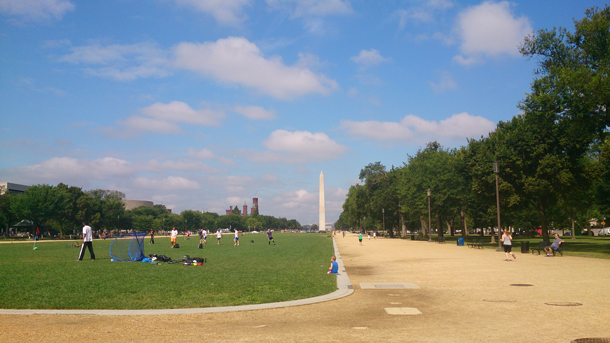
The National Mall may not be isolated wilderness but, according to Zarr, access to the outdoors of any kind, even in crowded, heavily traveled areas, can still have health benefits. (Photo: Sheila Thomson, Flickr CC, BY 2.0)
So, it's a different landscape now and now we have a generation of kids who, they don't necessarily even know what to do outdoors, how to be outdoors. Frankly, we hardly even know how to sit down without pulling out our cell phone. I mean, we don't know how to be bored anymore. Boredom isn't the answer here but certainly being mindful of what's around us and using our senses is a really important step to getting to understand what it is that is actually ailing us.
CURWOOD: So, doctor, why write a prescription? Why not just say, “Hey, get outside”?
ZARR: Because that's precisely what we've been doing for the last several decades, is we've been saying to people, hey, eat better, exercise, I'll see you in a year. They come back. They weigh 20 more pounds. Their blood pressure has gone up, and they're more anxious than when they saw you a year ago. It doesn't work, so we've been looking for ways for it to make better results, frankly. And, when you write a prescription, it's sort of a contract of sorts, right?
Listen, Steve, if you were to come in with a pneumonia, I wouldn't just say to you, “Take any antibiotic you like, take them for as often as you want, as many pills as you want at one time with or without water, do whatever you like and I'll just see you whenever.” I don't do that, and I shouldn't be doing that with my prescription for nature, and so we try to be very specific about it with the understanding that our patient right there is willing to take that step.
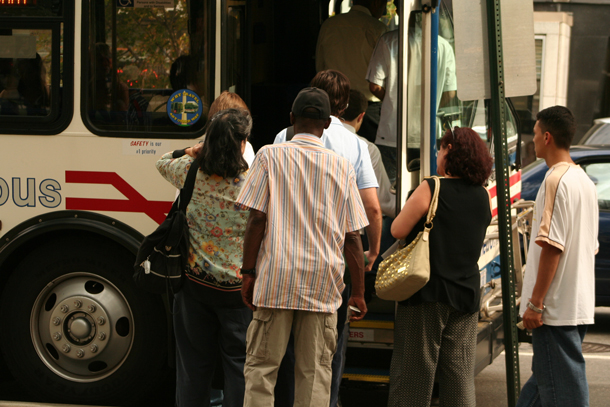
For some, a park prescription can be as simple as getting off the bus a few stops early and walking through green space the rest of the way. (Photo: Elvert Barnes, Flickr CC BY 2.0)
CURWOOD: Talk to me about some recent nature prescriptions that you've given to folks, what you were treating, what you told them to do, and what kind of results have you seen?
ZARR: Well, I probably do this. I see patients almost every day so it's a pretty common experience. So, I'm thinking of one girl in particular who I wrote a prescription for several years ago and, you know, when we had started having this conversation she was at a point where she was clearly overweight. She might have been obese actually, I'm trying to remember where she was on her body mass index, and she wanted to get active. And I said, “Well, where do you go to school?” She gave me her routine and when she gets up, she gets up pretty darn early, she takes two buses, she takes a train to get to school to go all the way across town. So, she wasn't super comfortable really doing something in the evening or the afternoon because she got home already after dark as it was.
So, I said, “All right, you take one bus, a train and then a bus in that sequence. What about getting out off that bus just a few blocks early? Would you be willing to do that and walk the rest of the way?” And she said she was. So, we mapped it out for her. Her prescription was exit four stops from the bus earlier than you normally would and walk through a green area. We found a park, at least part of that walk was through a park, and that's kind of how we started, and to do that basically five days a week. Soon after that she became active in organized sports, and I saw an increase in her self-esteem. She went from being obese to overweight to a normal weight, and she maintains that weight still today.
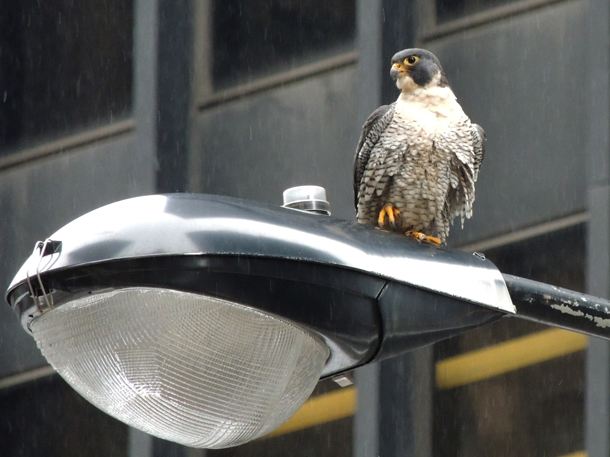
Park prescriptions can be especially effective when patients experience wildlife. Though wild animals are harder to find in major cities, they can be surprisingly commonplace if you take the time to look for them, says Zarr. (Photo: John W. Iwanski, Flickr CC BY-NC 2.0)
CURWOOD: And if you were to look at your patient load of over the past several years that you've been doing this, how effective do you think that your outdoor prescriptions, your nature prescriptions, your park prescriptions – that's for folks in the city, that's often where you find nature – how effective have those been?
ZARR: Well, we have about 50 prescribers across the country. The majority of them are in this area, the national capital region, but we're expanding. And so far it's been really positive. I have people stop me all the time from nurse practitioners to psychiatrists, podiatrists, medicine docs, telling me their stories, telling me how they wrote a prescription for patients suffering from depression to sit on a bench in a park and to see them back, to see that they are improving. So, from the stories, from the anecdotes, we're definitely feeling a bit of success in this.
We did a small study in 2013, when we started actually prescribing parks electronically, and from a more scientific perspective, we can say that we observed a significant change in people's time spent outdoors, so that was very encouraging, and we're in the midst of designing a study to look more deeply and more scientifically at whether the park prescription results in these changes in biometrics and health outcomes. The correlational studies I mentioned, they are just that, so it's definitely time for more of an observational study and eventually randomized control trial looking to see whether these actual prescriptions will result in not just a change in behavior, but in actual improved health outcomes.
ZARR: So, to what extent do you see public health as a factor in assessing how we conserve public parks across the municipal, state, and federal levels?
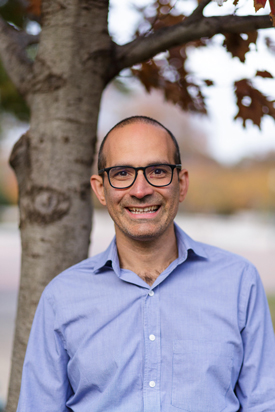
Robert Zarr, MD is the founder and medical director of Park Rx America. (Photo: Courtesy of Robert Zarr)
CURWOOD: This is all about public health. At the end of the day, I mean if there are no parks, if there is no fresh air, there's no clean water, if there are no birds, then we've got nothing to prescribe. Even the World Health Organization has been very clear to list access to green space as a social determinant of health. It should be just a no brainer, it's not to most people these days, and so that's part of we're doing is really making the case for why every human being on the Earth should have access to safe green space. Not just to recreate, not just to play – which, play is very important, recreation is important – but literally for your health.
CURWOOD: How much has this changed your life, doctor?
ZARR: Vastly changed my life. Sometimes, I don't have time to walk to the park myself. I'll go on the rooftop of our building and just get some sun for 20 minutes and there's some evidence as well that actually having sunshine is good for you in many many ways. In my work, as a pediatrician I've been really overwhelmed with the amount of chronic disease and the suffering that's just not necessary in people's lives. When I saw the connection, the scientific connection between being outdoors and relieving suffering, it's rare in a physician's life that we see a relatively inexpensive and effective intervention. It's amazing to me that we weren't doing this before and once I find a way to do something that is better than doing it before, I'm not going to go backwards.
CURWOOD: Pediatrician Robert Zarr is the Founder and Medical Director of Park Rx America based in Washington DC. Doctor Zarr, thanks so much for taking the time.
ZARR: Thank you for having me, Steve.
Links
Robert Zarr on NBC’s “A dose of nature: doctors prescribe a day in the park for anxiety”
Living on Earth wants to hear from you!
Living on Earth
62 Calef Highway, Suite 212
Lee, NH 03861
Telephone: 617-287-4121
E-mail: comments@loe.org
Newsletter [Click here]
Donate to Living on Earth!
Living on Earth is an independent media program and relies entirely on contributions from listeners and institutions supporting public service. Please donate now to preserve an independent environmental voice.
NewsletterLiving on Earth offers a weekly delivery of the show's rundown to your mailbox. Sign up for our newsletter today!
 Sailors For The Sea: Be the change you want to sea.
Sailors For The Sea: Be the change you want to sea.
 The Grantham Foundation for the Protection of the Environment: Committed to protecting and improving the health of the global environment.
The Grantham Foundation for the Protection of the Environment: Committed to protecting and improving the health of the global environment.
 Contribute to Living on Earth and receive, as our gift to you, an archival print of one of Mark Seth Lender's extraordinary wildlife photographs. Follow the link to see Mark's current collection of photographs.
Contribute to Living on Earth and receive, as our gift to you, an archival print of one of Mark Seth Lender's extraordinary wildlife photographs. Follow the link to see Mark's current collection of photographs.
 Buy a signed copy of Mark Seth Lender's book Smeagull the Seagull & support Living on Earth
Buy a signed copy of Mark Seth Lender's book Smeagull the Seagull & support Living on Earth

